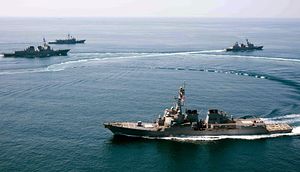The showdown begins in the South China Sea. The U.S. Navy, after a long debate and several delays, finally entered the 12 nautical mile zone of China’s man-made islands in the South China Sea in the name of “Freedom of Navigation.”
This is not surprising at all, as many previous leaks have already suggested that this operation would happen this year. In that regard, both the US move and China’s reactions to the move were also predictable. China strongly protested the U.S. move, and the United States quickly ended the operation without further provocations. To better understand how this new move by the U.S. will shape the future of Sino-U.S. relations and the territorial disputes in the South China Sea, we need to look at how both the U.S. and China can benefit or suffer from this new situation. We can then predict with some confidence how the future strategies of both powers will be.
What are the benefits to the U.S. with this move?
First, by entering the 12 nautical mile zone of China’s man-made islands, the U.S. directly challenges China’s sovereignty claims. The main U.S. claim is that the two features—Subi and Mischeef reefs—do not enjoy a 12 nautical mile territorial sea status as they are submerged at low-tide features. Interestingly, China has not previously made any officials claims that the two features do have territorial sea status. Nonetheless, this new U.S. move is believed to put pressures on China to clarify its position on such features and the larger nine dash line issue in the future.
Second, this move shows to the whole world that the U.S. is still the real leader in global affairs and that its navy can go anywhere it wants to demonstrate its power.
Third, the U.S. move has won support from its allies in Asia, particularly Japan and the Philippines. These allies have long argued for a tougher U.S. policy toward China regarding the South China Sea, and finally the U.S. is answering the call. Finally, this particular operation ended safely without causing any conflict with the Chinese navy, thus paving some ground for future more regular operations.
While it might seem that the U.S. has won some points with this new operation, China has actually also benefited some from this tension. This might be hard for some to believe, but a low-level tension between China and the U.S. is not all that bad for China.
The U.S. intrusion would give China a more legitimate reason to militarize these maritime features. The logic is this: the U.S. started this game and we are just responding to it. Indeed, this has been the pattern of China’s foreign policies in the last few years, as I have discussed elsewhere . Defensive assertiveness is the main feature of Chinese foreign policy these days and we should expect this pattern to be continued in the ongoing U.S.-China showdown.
Moreover, tensions in the South China Sea strengthen the CCP’s domestic rule, even though this might be an unexpected outcome from the U.S. perspective. A number of scholars have studied the ‘rally round the flag’ effect during an international crisis, concluding that domestic criticisms of government policies drop sharply during international crises. Given the already high-level of nationalistic sentiments in China, a crisis involving China and the United States would only strengthen the CCP and President Xi Jinping’s popularity in China.
To conclude, in the short run, both the U.S. and China can reap some benefits from this low-level tension. However, if the situation continues to escalate, which is probably not what the powers like to see, then the outcome is hard to predict. Which power would claim a victory, however relative, would depend on a set of factors such as national resolve and domestic support. One thing is certain though: the showdown has just begun and the struggle between the U.S. and China in the South China Sea will be long-term, complicated, and chaotic one.

































